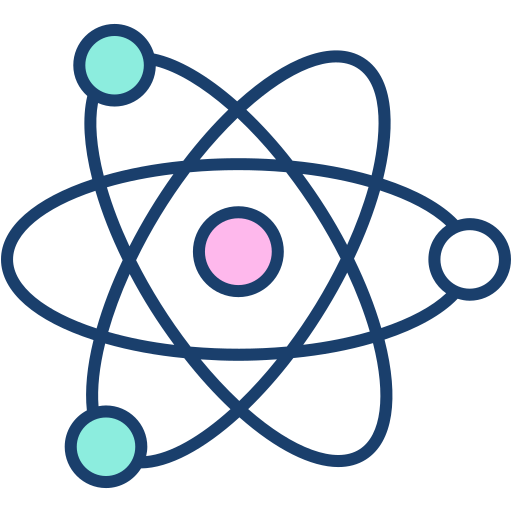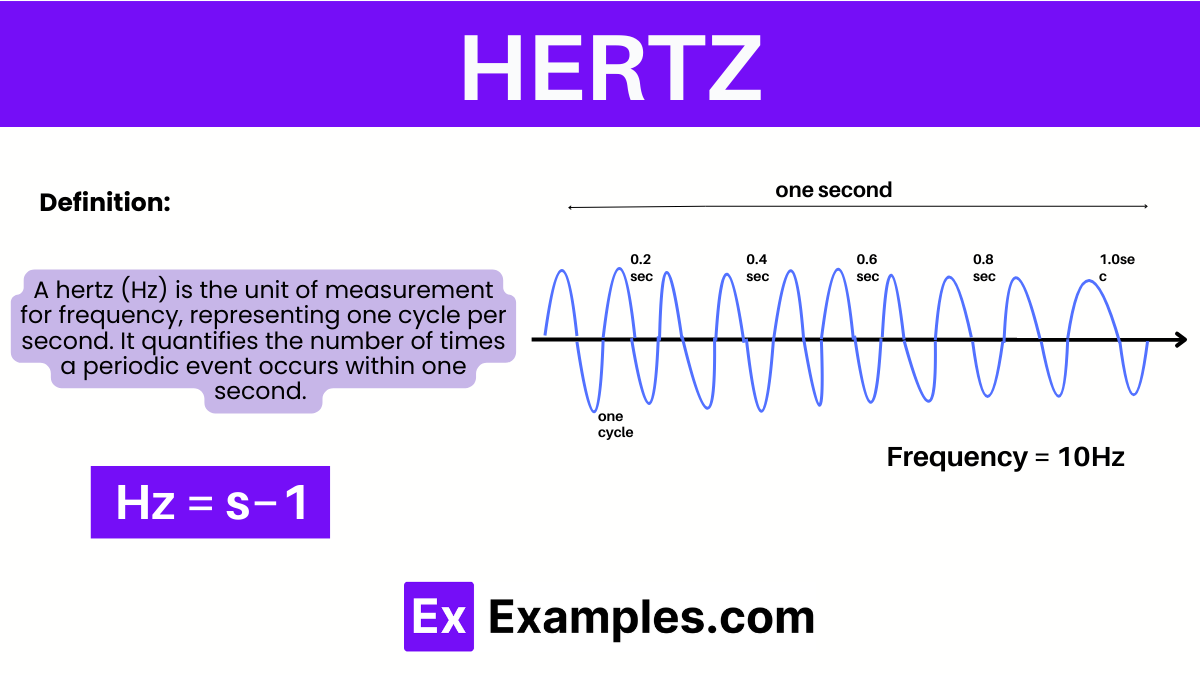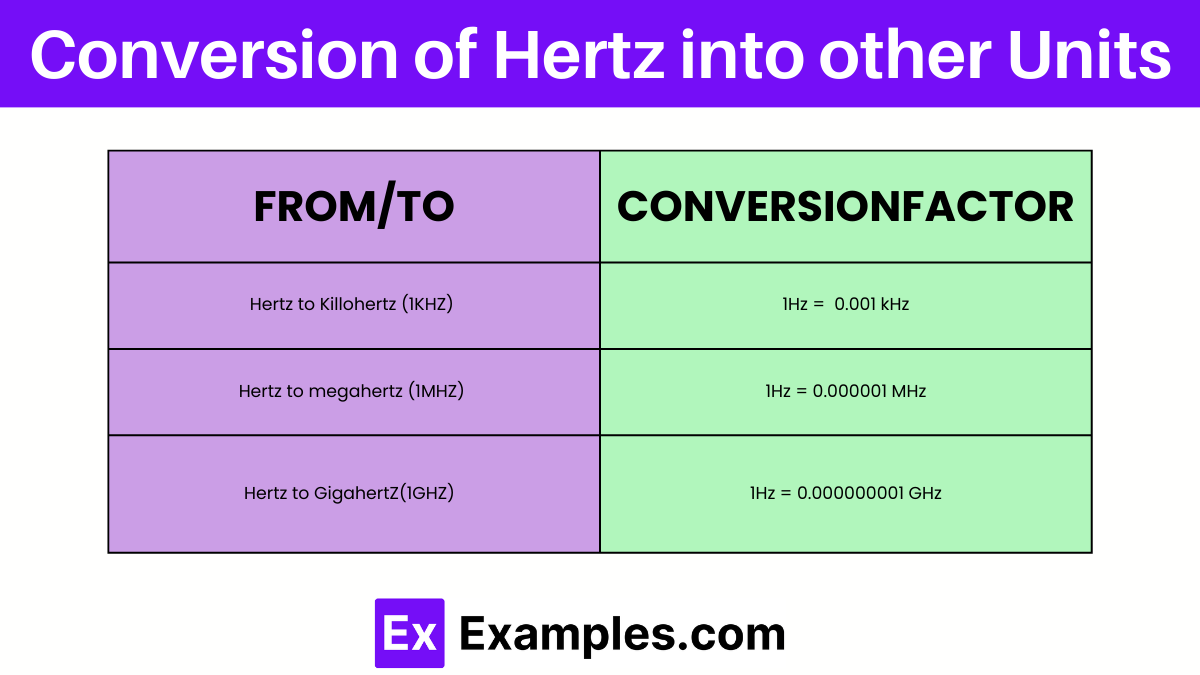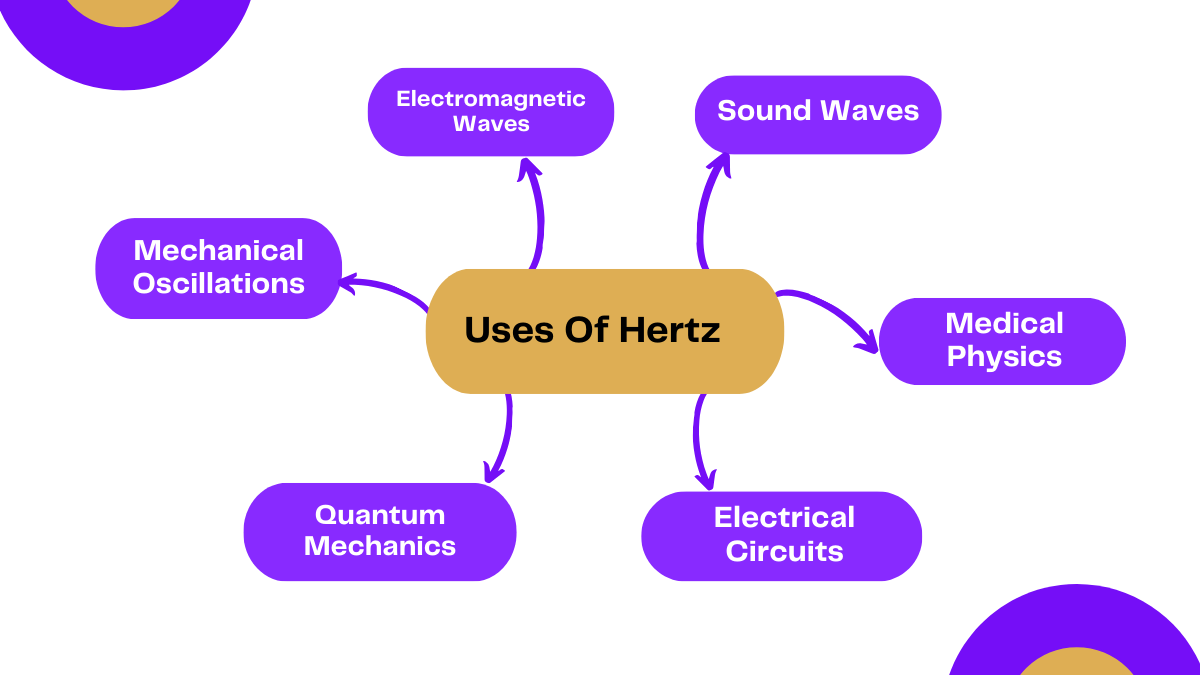What is the unit of frequency?
Joule
Watt
Hertz
Newton


A hertz (Hz) is the unit of frequency, representing one cycle per second. It quantifies the number of times a periodic event occurs within one second. Hertz is commonly used to describe the frequency of various phenomena, such as sound waves, electromagnetic waves, and oscillations in electronic circuits.
The unit of frequency, the hertz (Hz), measures the number of cycles or occurrences of a periodic event per second. In terms of its derived units.
This means that one hertz is equivalent to one cycle per second. It quantifies the rate at which events repeat within a given timeframe.
In physics, the hertz (Hz) finds applications in various phenomena and experiments:
1.Wave Analysis: Hertz is crucial in the study of wave motion, including sound waves, electromagnetic waves, and mechanical waves. It helps physicists analyze the frequency, wavelength, and velocity of waves, aiding in understanding their behavior and propagation.
2.Resonance: Hertz is fundamental in studying resonance phenomena, where systems oscillate with maximum amplitude at their natural frequencies. Understanding resonance is essential in fields like acoustics, optics, and mechanics, enabling the design of efficient systems such as musical instruments and structural damping.
3.Spectroscopy: In spectroscopic techniques like nuclear magnetic resonance (NMR) and electron spin resonance (ESR), hertz plays a crucial role in determining the frequency of electromagnetic radiation absorbed or emitted by atoms and molecules. This information helps scientists elucidate molecular structures and dynamics.
4.Electronics and Circuit Analysis: Hertz is vital in analyzing electronic circuits and devices. It helps physicists determine the operating frequencies of circuits, design filters, and analyze signals in communication systems, radar, and wireless technologies.
5.Quantum Mechanics: In quantum mechanics, hertz is utilized in understanding the behavior of particles and systems at the atomic and subatomic levels. It plays a role in studying phenomena like atomic transitions, energy levels, and spectroscopic measurements, contributing to advancements in quantum computing and quantum information science.
| Submultiples | Multiples | ||||
|---|---|---|---|---|---|
| Value | SI Symbol | Name | Value | SI Symbol | Name |
| 10⁻¹ Hz | dHz | Decihertz | 10¹ Hz | daHz | Decahertz |
| 10⁻² Hz | cHz | Centihertz | 10² Hz | hHz | Hectohertz |
| 10⁻³ Hz | mHz | Millihertz | 10³ Hz | kHz | Kilohertz |
| 10⁻⁶ Hz | μHz | Microhertz | 10⁶ Hz | MHz | Megahertz |
| 10⁻⁹ Hz | nHz | Nanohertz | 10⁹ Hz | GHz | Gigahertz |
| 10⁻¹² Hz | pHz | Picohertz | 10¹² Hz | THz | Terahertz |
| 10⁻¹⁵ Hz | fHz | Femtohertz | 10¹⁵ Hz | PHz | Petahertz |
| 10⁻¹⁸ Hz | aHz | Attohertz | 10¹⁸ Hz | EHz | Exahertz |
| 10⁻²¹ Hz | zHz | Zeptohertz | 10²¹ Hz | ZHz | Zettahertz |
| 10⁻²⁴ Hz | yHz | Yoctohertz | 10²⁴ Hz | YHz | Yottahertz |
| 10⁻²⁷ Hz | rHz | Rontohertz | 10²⁷ Hz | RHz | Ronnahertz |
| 10⁻³⁰ Hz | qHz | Quectohertz | 10³⁰ Hz | QHz | Quettahertz |

| Unit | Relationship | Example: 1 Hz Converted |
|---|---|---|
| Kilohertz (kHz) | 1 kHz = 1,000 Hz | 1 Hz = 0.001 kHz |
| Megahertz (MHz) | 1 MHz = 1,000,000 Hz | 1 Hz = 0.000001 MHz |
| Gigahertz (GHz) | 1 GHz = 1,000,000,000 Hz | 1 Hz = 0.000000001 GHz |
A Kilohertz represents a thousand cycles per second. This conversion is useful in contexts where frequencies are too large to be conveniently expressed in Hertz, such as in radio broadcasting or sound waves.
A Megahertz equals one million cycles per second. This unit is crucial in telecommunications, such as radio frequency allocation and the clock speeds of computer processors.
A Gigahertz represents one billion cycles per second. It is commonly used to measure the frequency of electromagnetic waves, such as those used in cell phones and microwave ovens, as well as the speed of modern computer processors.

In physics, the unit hertz (Hz) is extensively used to measure the frequency of waves and oscillatory processes. Frequency, defined as the number of cycles per second, is a fundamental concept in various branches of physics. Here are some key applications of hertz in physics:
1.Electromagnetic Waves: Hertz is crucial for describing the frequency of electromagnetic waves, which includes radio waves, microwaves, infrared, visible light, ultraviolet, X-rays, and gamma rays. The frequency of these waves determines their properties and the type of electromagnetic radiation they are classified as.
2.Sound Waves: In acoustics, hertz measures the frequency of sound waves, which relates directly to the pitch of the sound. Higher frequencies correspond to higher pitches. This is important in areas ranging from music to the study of human and animal hearing.
3.Mechanical Oscillations: Hertz is used to describe the frequency of oscillations in mechanical systems like pendulums, vibrating strings, and springs. This applies to simple harmonic motion and more complex systems in engineering and technology.
4.Quantum Mechanics: In quantum physics, the energy levels of systems are often related to frequencies through Planck’s equation, E = hν, where E is energy, h is Planck’s constant, and ν (nu) is the frequency in hertz. This relation is vital for understanding phenomena such as atomic spectral lines and quantum state transitions.
5.Electrical Circuits: In electrical engineering and electronics, the frequency of alternating current (AC) circuits is measured in hertz. This frequency determines the behavior of the circuits and their components, such as resistors, capacitors, and inductors.
6.Medical Physics: In medical applications, such as MRI machines and ultrasound diagnostics, hertz measures the frequency of the electromagnetic fields or sound waves used to image parts of the body.
No, Hertz cannot be directly converted to watts or volts because they measure different things. Hertz measures frequency, or cycles per second, while watts measure power, and volts measure electric potential difference.
Megahertz (MHz) and Gigahertz (GHz) are larger units of frequency. One Megahertz equals one million Hertz, and one Gigahertz equals one billion Hertz. MHz is frequently used in the context of radio frequencies and CPU clocks, while GHz is commonly associated with the frequencies of modern computer processors and various telecommunications technologies.
Music and Sound: Musical pitches and sound frequencies are measured in Hertz. Middle C on a piano resonates at about 261.6 Hz.
Radio Frequencies: FM radio stations broadcast in frequencies usually ranging from 88 to 108 MHz.
Computer Processors: Modern CPUs operate at speeds often measured in GHz, such as 3.5 GHz.
Text prompt
Add Tone
10 Examples of Public speaking
20 Examples of Gas lighting
What is the unit of frequency?
Joule
Watt
Hertz
Newton
If a tuning fork vibrates at 440 Hz, how many vibrations does it make in one second?
44
220
440
880
What is the period of a wave with a frequency of 50 Hz?
0.01 s
0.02 s
0.03 s
0.04 s
Which of the following frequencies is within the audible range for humans?
5 Hz
50 Hz
5000 Hz
50,000 Hz
What is the frequency of an alternating current (AC) in the United States?
50 Hz
60 Hz
100 Hz
120 Hz
If a clock ticks 60 times in one minute, what is the frequency of the ticking?
1 Hz
2 Hz
0.5 Hz
0.25 Hz
What is the frequency of a wave that completes one cycle every 5 milliseconds?
50 Hz
100 Hz
200 Hz
1000 Hz
Which frequency is higher?
500 MHz
5 GHz
0.5 THz
50 kHz
A radio station broadcasts at a frequency of 95.7 MHz. What does MHz stand for?
Megahertz
Millihertz
Microhertz
Metahertz
Which type of electromagnetic wave has the highest frequency?
Radio waves
Microwaves
Ultraviolet waves
Gamma rays
Before you leave, take our quick quiz to enhance your learning!

